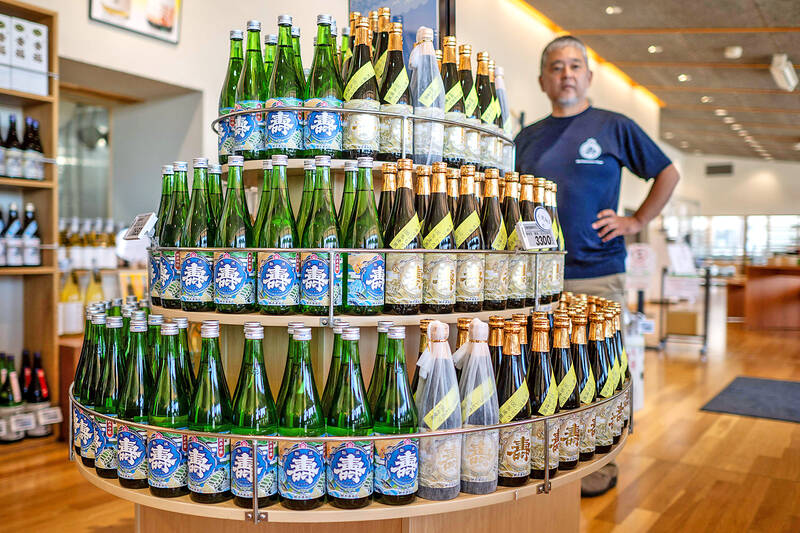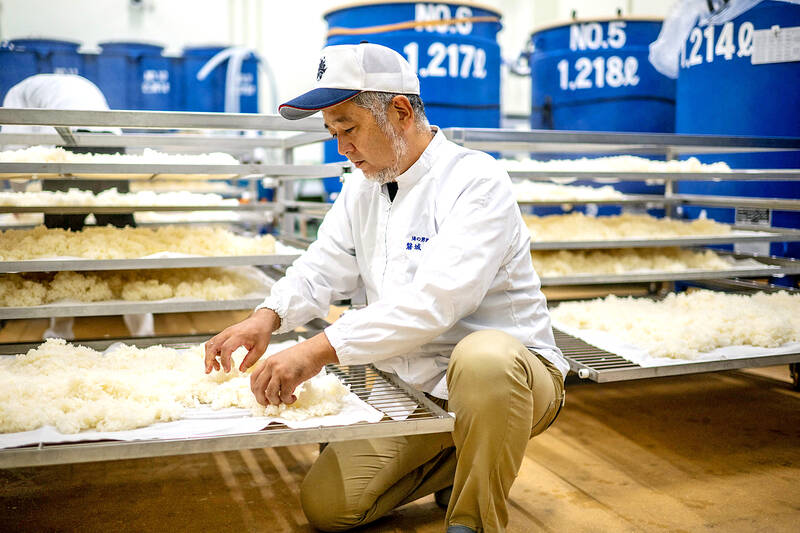Daisuke Suzuki is helping by doing what he does best as life tentatively returns to normal for the devastated fishing communities of Japan’s Fukushima Prefecture: making sake.
The toji (brewmaster) and his family were lucky to escape with their lives when a huge earthquake and tsunami devastated the region in March 2011, killing about 18,000 people and knocking out the nearby Fukushima Dai-ichi nuclear power plant.
In Namie, the disaster obliterated the old port of Ukedo and its local fishing industry, as well as the Iwaki Kotobuki sake brewery that Suzuki’s family has owned for five generations.

Photo: AFP
For two centuries at least it had made the rice wine that revived many a fishers’ spirits after returning to port from the capricious Pacific Ocean with a hold brimming with fish.
They would drink cups of Iwaki Kotobuki sake over white-meat sashimi of flounder and bass, delicacies from the Fukushima coast.
“The sake was always there, just like the fish,” said one taciturn local fisherman, who did not want to be identified. “That is the way it has been here since my childhood.”

Photo: AFP
With radiation levels dangerously high, Suzuki and others were not allowed return and look for lost neighbors until a year after the catastrophe.
“We lost the land that gave us our livelihood, and people disappeared from the town,” the 50-year-old said, next to where his brewery once stood.
People are banned from living in the coastal area where he used to work, not because of the radiation, but because of the high tsunami risk.
“I had nothing left and couldn’t imagine how I could start making sake again,” he said.
Then, a month after the disaster, came a phone call out of the blue from a research laboratory.
It still kept Iwaki Kotobuki’s yeast starter, the all-important shubo that is crucial to a sake’s taste.
Suzuki was able to resume his trade at his new brewery far from Ukedo in Yamagata Prefecture on the other side of Honshu island.
With sake-brewing being tricky, depending on water quality, the rice and myriad other factors, it took him a long time to get the taste exactly right.
“Over centuries, my ancestors had worked to create the flavor of the Iwaki Kotobuki sake to suit to fish,” he said.
Two years ago, the government gave the all-clear for the sale of fish from the Fukushima region to resume.
The fishers needed something to drink, so Suzuki built a new sake plant in Namie.
The local fishing industry has slowly recovered, although in August China banned seafood imports from Japan after its neighbor began releasing treated wastewater from the nuclear plant, dealing another blow to Fukushima’s fishing communities.
To help, this year he introduced a sake called “Gyoshu [fish type] Mariage,” designed for pairing with eight different kinds of Fukushima seafood, such as flounder, surf clam and Japanese mitten crab.
“We analyzed the seafood’s five aspects of taste — sweetness, saltiness, acidity, bitterness and savoriness — and used AI [artificial intelligence] to design the sake each for the best pairing,” he said.
Yasushi Niitsuma, 64, an izakaya pub owner near the port, recalled how local fishers and residents enjoyed drinking Iwaki Kotobuki before 2011.
“The restart of the sake brewery is the town’s pride,” said Niitsuma, who himself was forced to leave the area for years before returning.
“The sake is the tradition of the town. Daisuke helped the tradition continue,” he said. “And it encourages fishermen to continue fishing.”

‘UNUSUAL EVENT’: The Australian defense minister said that the Chinese navy task group was entitled to be where it was, but Australia would be watching it closely The Australian and New Zealand militaries were monitoring three Chinese warships moving unusually far south along Australia’s east coast on an unknown mission, officials said yesterday. The Australian government a week ago said that the warships had traveled through Southeast Asia and the Coral Sea, and were approaching northeast Australia. Australian Minister for Defence Richard Marles yesterday said that the Chinese ships — the Hengyang naval frigate, the Zunyi cruiser and the Weishanhu replenishment vessel — were “off the east coast of Australia.” Defense officials did not respond to a request for comment on a Financial Times report that the task group from

DEFENSE UPHEAVAL: Trump was also to remove the first woman to lead a military service, as well as the judge advocates general for the army, navy and air force US President Donald Trump on Friday fired the chairman of the Joint Chiefs of Staff, Air Force General C.Q. Brown, and pushed out five other admirals and generals in an unprecedented shake-up of US military leadership. Trump wrote in a post on Truth Social that he would nominate former lieutenant general Dan “Razin” Caine to succeed Brown, breaking with tradition by pulling someone out of retirement for the first time to become the top military officer. The president would also replace the head of the US Navy, a position held by Admiral Lisa Franchetti, the first woman to lead a military service,

Four decades after they were forced apart, US-raised Adamary Garcia and her birth mother on Saturday fell into each other’s arms at the airport in Santiago, Chile. Without speaking, they embraced tearfully: A rare reunification for one the thousands of Chileans taken from their mothers as babies and given up for adoption abroad. “The worst is over,” Edita Bizama, 64, said as she beheld her daughter for the first time since her birth 41 years ago. Garcia had flown to Santiago with four other women born in Chile and adopted in the US. Reports have estimated there were 20,000 such cases from 1950 to

CONFIDENT ON DEAL: ‘Ukraine wants a seat at the table, but wouldn’t the people of Ukraine have a say? It’s been a long time since an election, the US president said US President Donald Trump on Tuesday criticized Ukrainian President Volodymyr Zelenskiy and added that he was more confident of a deal to end the war after US-Russia talks. Trump increased pressure on Zelenskiy to hold elections and chided him for complaining about being frozen out of talks in Saudi Arabia. The US president also suggested that he could meet Russian President Vladimir Putin before the end of the month as Washington overhauls its stance toward Russia. “I’m very disappointed, I hear that they’re upset about not having a seat,” Trump told reporters at his Mar-a-Lago resort in Florida when asked about the Ukrainian